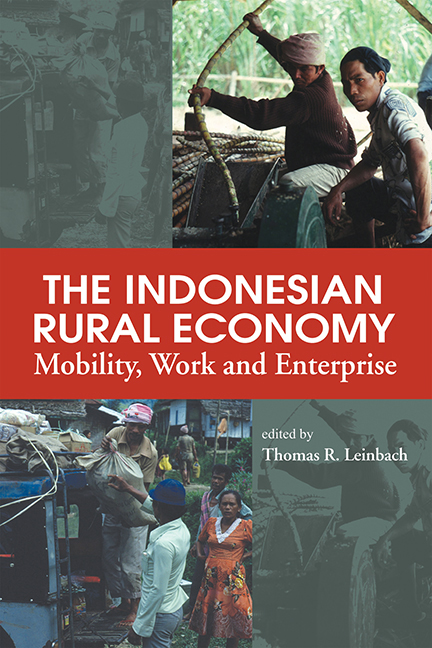Book contents
- Frontmatter
- Content
- List of Tables
- List of Figures
- Contributors
- Acknowledgements
- Glossary
- Foreword
- Part I The Development Context
- Part II Entrepreneurship, Gender and Mobility Issues
- Chapter 5 International Labour Migration and Rural Dynamics: A Study of Flores, East Nusa Tenggara
- Chapter 6 Gender, Socio-Spatial Networks, and Rural Non-Farm Work Among Migrants in West Java
- Chapter 7 Micro and Small-Scale Enterprises in Java: A Gender-Based Comparative Analysis of Entrepreneurial Behaviour and Performance of Enterprises
- Chapter 8 Migrant Entrepreneurs in East Indonesia
- Part III Indonesia's Rural Non-Farm Economy: Case Studies and Policy Development
- Index
Chapter 7 - Micro and Small-Scale Enterprises in Java: A Gender-Based Comparative Analysis of Entrepreneurial Behaviour and Performance of Enterprises
from Part II - Entrepreneurship, Gender and Mobility Issues
Published online by Cambridge University Press: 21 October 2015
- Frontmatter
- Content
- List of Tables
- List of Figures
- Contributors
- Acknowledgements
- Glossary
- Foreword
- Part I The Development Context
- Part II Entrepreneurship, Gender and Mobility Issues
- Chapter 5 International Labour Migration and Rural Dynamics: A Study of Flores, East Nusa Tenggara
- Chapter 6 Gender, Socio-Spatial Networks, and Rural Non-Farm Work Among Migrants in West Java
- Chapter 7 Micro and Small-Scale Enterprises in Java: A Gender-Based Comparative Analysis of Entrepreneurial Behaviour and Performance of Enterprises
- Chapter 8 Migrant Entrepreneurs in East Indonesia
- Part III Indonesia's Rural Non-Farm Economy: Case Studies and Policy Development
- Index
Summary
Introduction
The concept of low income people entering the economic main stream through self-employment and perhaps creating new business and jobs that can revitalize communities has considerable appeal. Also, the less than successful results of industrialization policies in densely populated areas of developing countries and the inability of the agricultural sector to absorb surplus labour and reduce poverty have prompted the need to focus on alternatives. The case of micro and small enterprises (MSE) as a source of employment and income creation reflects this reality. The potential contribution of small enterprises (fifty workers or less) in generating employment and income in developing countries has been increasingly recognized. The development of MSEs is seen as a way of targeting aid at the poor and creating job opportunities (Liedholm, McPherson and Chuta 1994; Humphrey and Schmitz 1996).
Additionally, MSEs are also important because of their geographic location and increasing participation by women in developing countries. Many, if not the majority of new women workers in developing countries have entered the labour force through the MSE sector, primarily because of ease of entry and limited access to other enterprises and employment opportunities. Small enterprises play a critical role in times of economic change by providing a buffer for both upward and downward mobility. The development of the MSE sector has also been considered as an alternative strategy to strengthen the role of small town in rural development (Downing 1990). Recognizing this, the Government of Indonesia (GOI) has long recognized the importance of small scale and cottage industries in regional and national economic development. Recent economic turbulence and concern with growing economic and social inequalities have stimulated discussions of means and objectives of government policies regarding small businesses.
Indonesia's population grew at a rate of 1.6 percent per annum over the decade from 1990 to 2000. Its population is relatively young implying that Indonesia's labour force will grow faster and the demand for new job opportunities will continue into the future. The size of the nation's labour force increased from 52.4 million in 1980 to over 101 million by the year 2000. After 33 years of virtually uninterrupted 7 percent annual growth, Indonesia's GDP slumped nearly 13 percent in 1998 and per capita income dropped from $1,200 in 1996 to $570 in 2000.
- Type
- Chapter
- Information
- The Indonesian Rural EconomyMobility, Work and Enterprise, pp. 152 - 181Publisher: ISEAS–Yusof Ishak InstitutePrint publication year: 2003

